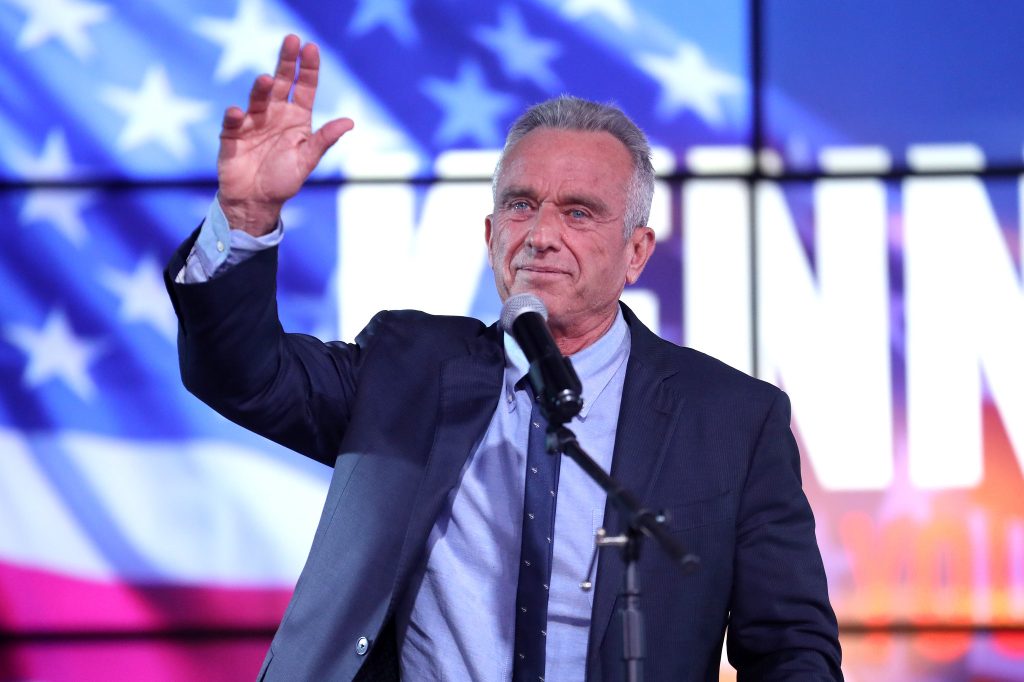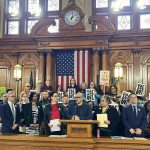Wisconsin Supreme Court Rejects RFK Jr.’s Effort to Get Off November Ballot
Kennedy suspended presidential campaign, fears he will take votes away from Trump.

Robert F. Kennedy, Jr. speaking with supporters at a campaign rally at Legends Event Center in Phoenix, Arizona. Photo by Gage Skidmore. (CC BY-SA 2.0)
The state Supreme Court has rejected an effort by independent presidential candidate Robert F. Kennedy Jr. to remove his name from Wisconsin’s presidential ballot.
In a ruling issued Friday afternoon, the Wisconsin Supreme Court said Kennedy’s campaign had failed to show a lower court ruling keeping him in play should be overturned.
Kennedy filed thousands of signatures on Aug. 6 to get on Wisconsin’s presidential ballot. Three weeks later, on Aug. 23, he suspended his campaign and endorsed former President Donald Trump.
That same day, he asked to have his name removed from the ballot in Wisconsin and other battleground states, expressing a concern that he could play spoiler for Trump.
On Aug. 27, the bipartisan Wisconsin Elections Commission denied the request on a 5-1 vote, with Chair Ann Jacobs, a Democrat, arguing state law required Kennedy to remain on the ballot.
Kennedy’s campaign challenged the ruling in Dane County Circuit Court, but he lost, with Judge Stephen Ehlke ruling Kennedy had “no one to blame but himself if he didn’t want to be on the ballot.”
The campaign then challenged that outcome in an appeals court, which the Wisconsin Supreme Court bypassed at the request of WEC, arguing time was of the essence as voting is already underway.
In its ruling, the Wisconsin Supreme Court said Kennedy’s side had failed to show the circuit court ruling was improperly reached.
Kennedy’s attorney, Joseph Bugni, argued Kennedy and other independent candidates are held to different standards than major party candidates. He also argued Kennedy’s First Amendment rights were violated by being identified as a presidential candidate when he no longer sought votes.
In its ruling, the high court said the constitutional arguments were “inadequately” developed.
Bugni declined comment to WPR.
In a concurring opinion, written by Justice Rebecca Bradley and joined by Chief Justice Annette Ziegler, both conservatives, Bradley said the “ramifications in this case are immense.”
“Voters may cast their ballots in favor of a candidate who withdrew his candidacy, thereby losing their right to cast a meaningful vote. Ballots listing a non-candidate mislead voters and may skew a presidential election. In this case, the damage to voter participation in electoral democracy is real,” she wrote.
Kennedy’s campaign had also argued clerks could cover his name with stickers, a feat WEC attorneys said would take tens of thousands of man hours and could gum up voting machines. As of last week, the WEC told the court that hundreds of thousands of absentee ballots had already been sent out to voters.
In addition to Trump and Democratic Vice President Kamala Harris, Kennedy is one of six independent presidential candidates on Wisconsin’s ballot. The others are Constitution Party candidate Randall Terry, Libertarian candidate Chase Oliver, Wisconsin Green candidate Jill Stein, Claudia De la Cruz of the Party for Socialism and Liberation and Cornel West of the Justice For All Party.
The latest Marquette University Law School poll, conducted in late August and early September, showed Kennedy receiving 6 percent of the vote. Oliver, Stein and West received 1 percent among registered voters.
While their support is relatively small, independent candidates can have an outsized influence on elections in Wisconsin, where the last two races for president have been decided by less than 1 percentage point.
That’s particularly true with Kennedy, who has consistently drawn more support from Republicans than from Democrats over the course of Marquette’s polling.
Kennedy has fought to remove his name from other swing state ballots, succeeding in Arizona, Georgia, Nevada and North Carolina but failing in Michigan. On Friday, the U.S. Supreme Court rejected an attempt to remain on the ballot in New York.
Wisconsin Supreme Court rejects RFK Jr.’s efforts to get off November ballot was originally published by Wisconsin Public Radio.
If you think stories like this are important, become a member of Urban Milwaukee and help support real, independent journalism. Plus you get some cool added benefits.






















He is one weird duck.
He also sued the state of NY to GET ON their ballot and they just refused him.